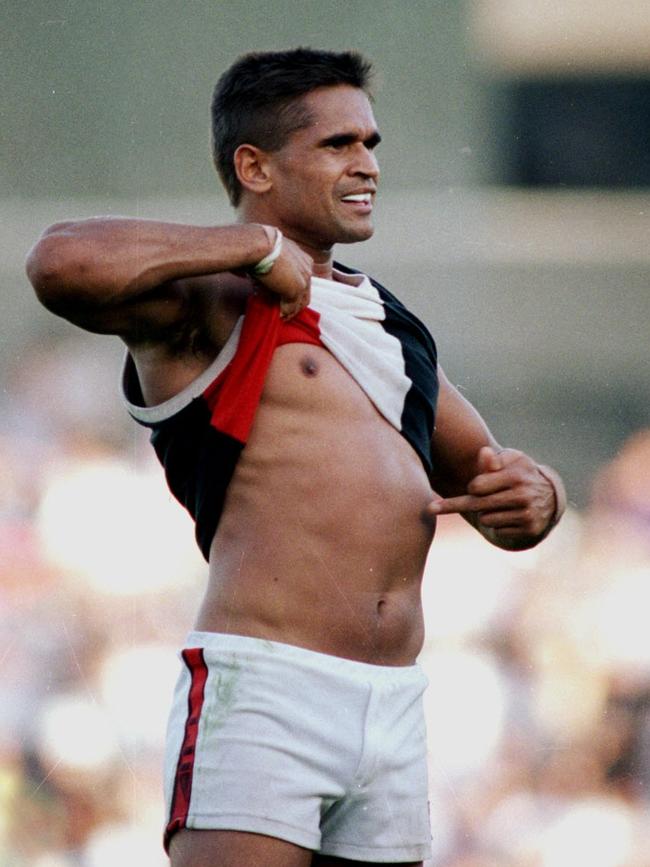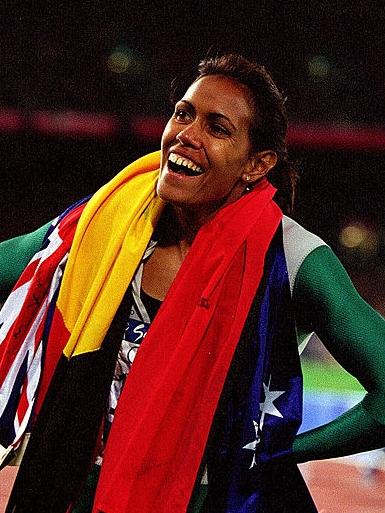There are no Voice veto powers. That myth has been busted | Douglas Smith
This is not a fight against racism or for greater acceptance in this country. This is something completely different, writes Douglas Smith.
Opinion
Don't miss out on the headlines from Opinion. Followed categories will be added to My News.
What business does professional sport in Australia have to do with politics in this country? A hell of a lot, if you ask me, especially if you are Indigenous.
It has taken the courage, talent and resilience of a few Indigenous athletes to change the attitudes of millions of Australians over the decades.
Athletes such as Nicky Winmar, who, I believe, in 1993, not only changed the game of Australians rules football but the attitudes of people across the country for generations.
Or Cathy Freeman, who, at the 2000 Sydney Olympics, showed the world what the Indigenous people of this country are capable of, which is a lot more than they are given credit for.
Their acts – and successes – are still remembered and celebrated today.
They are just two of many athletes who have fought to pave the way for Indigenous people in sport and in the community.
I feel that Indigenous people have become more accepted in Australian society because of the abilities of their athletes over the decades.
So, when I see our major sporting codes publicly announcing support for a Voice to Parliament to be enshrined in the Constitution later this year, I think about what this means in 2023.
It feels different this time.
This is not a fight against racism or for greater acceptance in this country. This is something completely different.
But if a sporting code told you that racism was wrong and that you should learn to be more accepting of people from different cultures and backgrounds, I hope you would agree.


Racism has held us back, government policies have held us back. A lot of racism towards Indigenous people over the years has been because of politics in this country, so when a politician says that sport has no place in politics, they are lying.
Sport in Australia, especially for Indigenous people, has been a vehicle for change, and I am grateful to those who have paved the way.
However, I do not believe that a major sporting code should tell you how to vote at a referendum, but, instead, should encourage you to seek the right information, join the conversation and make your own decision when the time comes.
Whether I support the Indigenous Voice to Parliament or not, I would never tell you how to vote and do not expect you to agree with me on my intentions.
I would rather you do your own research, have your own conversations with your family and friends, and come to your own conclusion.
This is a significant time for Australia and, by the end of the year, could change the direction of where we, as a nation, are headed for generations to come. It will either be a “Yes” or a “No”.
When the time comes, I encourage Australians to think about a few things. One is: Why are the statistics still stacked against Indigenous people? Another is: What would self-determination mean for us?
Has the government, for too long, made the wrong decisions for Indigenous people, and is that why there is such a large gap between Indigenous and non-Indigenous people in all aspects of life?
Lastly, if Indigenous Australians had more of a say on the laws, policies and decisions that the federal government makes for us, would we be better off for it?
I believe so. But, I cannot tell you that a Voice will fix everything for us, because I do not know the full details of how it will work. That, obviously, comes after a successful referendum.
What I do know is that we, the First Peoples of Australia, need to be strong in our culture and we need to be able to make decisions for ourselves because only we know what is best for us.
Since colonisation, we have been stripped of all our rights to practice our culture, we have lost our language, we have lost our land, and our spirit has been disturbed.
Yes, we have made progress in the past few decades such as the 1967 Referendum, but that only gave the government the power to make laws for us, which was a significant step in the right direction for Indigenous people.
Now, it looks like what the Voice is asking is for Australia to take another step forward – but with Indigenous people helping to lead the way.
I am not saying “veto” powers or a “third chamber” of federal parliament, because that is not what the Voice will do. Those myths have been busted.
Just a Voice, a say, some input on the decisions that are made by the parliament daily that affects Indigenous people differently to non-Indigenous Australians.





